Exploring science communication competences

As part of our work on developing training for the science communication community, we have begun to identify science communication competences needed in different roles. Our initial work has focused on exploring the competences needed by science communication officers (e.g. those working in research institutions and universities), researchers and those working in science centres and museums.
Drawing on other European frameworks, we are developing a model that presents competences across a spectrum: foundational, intermediate, advanced and expert. We then plan to use this to help us organise the training we offer through the Training Centre which will form part of the Competence Centre for Science Communication.
During our recent project meeting in Madrid (22-23 September 2025), we invited the COALESCE partners and European Competence Centre Hubs to explore the work we have done so far to identify competences and critique and deepen it. This led to several key insights.
Firstly, it is clear that the group ‘science centres and museums’ is too narrowly defined and we are now looking for a new title that welcomes those working in a range of similar settings, including zoos, botanical gardens and galleries.
Secondly, we realised that the competence frameworks we were developing had become rather all-encompassing and did not clearly articulate those skills which are specific to science communication as opposed to more general skills required in the role. To this end, we plan to re-examine the frameworks to understand how we can better articulate the science communication component.
Thirdly, from the discussions we are now considering how we might signpost career pathways within the competence frameworks so that we can better highlight clusters of skills that may help build a career, for example specialists in digital media communication or exhibition development.
As our work continues in developing the competence frameworks, we will have additional opportunities to contribute to their formulation, for example through surveys. Please do consider contributing your ideas in due course.


